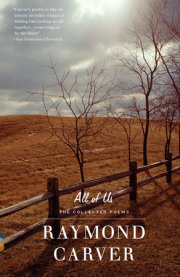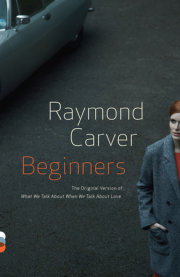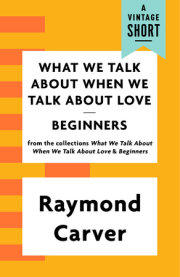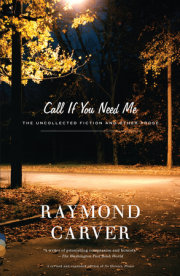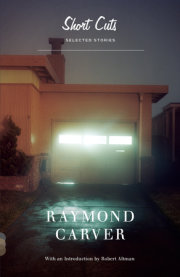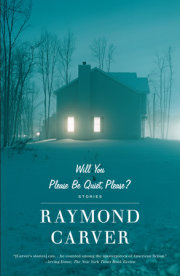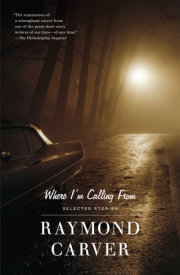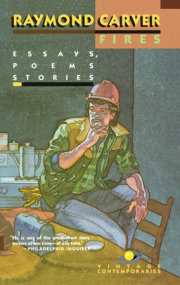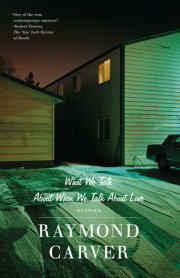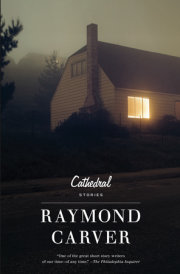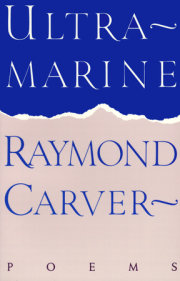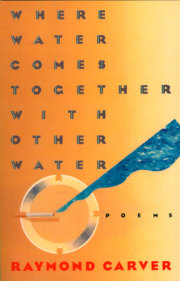So early it's still almost dark out. I'm near the window with coffee, and the usual early morning stuff that passes for thought. When I see the boy and his friend walking up the road to deliver the newspaper. They wear caps and sweaters, and one boy has a bag over his shoulder. They are so happy they aren't saying anything, these boys. I think if they could, they would take each other's arm. It's early in the morning, and they are doing this thing together. They come on, slowly. The sky is taking on light, though the moon still hangs pale over the water. such beauty that for a minute death and ambition, even love, doesn't enter into this. Happiness. It comes on unexpectedly. And goes beyond, really, any early morning talk about it.
IV. TUESDAY Photograph of My Father in His Twenty-Second Year October. Here in this dank, unfamiliar kitchen I study my father's embarrassed young man's face. Sheepish grin, he holds in one hand a string of spiny yellow perch, in the other a bottle of Carlsbad beer. In jeans and denim shirt, he leans against the front fender of a 1934 Ford. He would like to pose bluff and hearty for his posterity, wear his old hat cocked over his ear. All his life my father wanted to be bold. But the eyes give him away, and the hands that limply offer the string of dead perch and the bottle of beer. Father, I love you, yet how can I say thank you, I who can't hold my liquor either, and don't even know the places to fish? You Don't Know What Love Is (an evening with Charles Bukowski) You don't know what love is Bukowski said I'm 51 years old look at me I'm in love with this young broad I got it bad but she's hung up too so it's all right man that's the way it should be I get in their blood and they can't get me out They try everything to get away from me but they all come back in the end They all came back to me except the one I planted I cried over that one but I cried easy in those days Don't let me get onto the hard stuff man I get mean then I could sit here and drink beer with you hippies all night I could drink ten quarts of this beer and nothing it's like water But let me get onto the hard stuff and I'll start throwing people out windows I'll throw anybody out the window I've done it But you don't know what love is You don't know because you've never been in love it's that simple I got this young broad see she's beautiful She calls me Bukowski Bukowski she says in this little voice and I say What But you don't know what love is I'm telling you what it is but you aren't listening There isn't one of you in this room would recognize love if it stepped up and buggered you in the ass I used to think poetry readings were a copout Look I'm 51 years old and I've been around I know they're a copout but I said to myself Bukowski starving is even more of a copout So there you are and nothing is like it should be That fellow what's his name Galway Kinnell I saw his picture in a magazine He has a handsome mug on him but he's a teacher Christ can you imagine But then you're teachers too here I am insulting you already No I haven't heard of him or him either They're all termites Maybe it's ego I don't read much anymore but these people who build reputations on five or six books termites Bukowski she says Why do you listen to classical music all day Can't you hear her saying that Bukowski why do you listen to classical music all day That surprises you doesn't it You wouldn't think a crude bastard like me could listen to classical music all day Brahms Rachmaninoff Bartok Telemann Shit I couldn't write up here Too quiet up here too many trees I like the city that's the place for me I put on my classical music each morning and sit down in front of my typewriter I light a cigar and I smoke it like this see and I say Bukowski you're a lucky man Bukowski you've gone through it all and you're a lucky man and the blue smoke drifts across the table and I look out the window onto Delongpre Avenue and I see people walking up and down the sidewalk and I puff on the cigar like this and then I lay the cigar in the ashtray like this and take a deep breath and I begin to write Bukowski this is the life I say it's good to be poor it's good to have hemorrhoids it's good to be in love But you don't know what it's like You don't know what it's like to be in love If you could see her you'd know what I mean She thought I'd come up here and get laid She just knew it She told me she knew it Shit I'm 51 years old and she's 25 and we're in love and she's jealous Jesus it's beautiful she said she'd claw my eyes out if I came up here and got laid Now that's love for you What do any of you know about it Let me tell you something I've met men in jail who had more style than the people who hang around colleges and go to poetry readings They're bloodsuckers who come to see if the poet's socks are dirty or if he smells under the arms Believe me I won't disappoint em But I want you to remember this there's only one poet in this room tonight only one poet in this town tonight maybe only one real poet in this country tonight and that's me What do any of you know about life What do any of you know about anything Which of you here has been fired from a job or else has beaten up your broad or else has been beaten up by your broad I was fired from Sears and Roebuck five times They'd fire me then hire me back again I was a stockboy for them when I was 35 and then got canned for stealing cookies I know what's it like I've been there I'm 51 years old now and I'm in love This little broad she says Bukowski and I say What and she says I think you're full of shit and I say baby you understand me She's the only broad in the world man or woman I'd take that from But you don't know what love is They all came back to me in the end too every one of em came back except that one I told you about the one I planted We were together seven years We used to drink a lot I see a couple of typers in this room but I don't see any poets I'm not surprised You have to have been in love to write poetry and you don't know what it is to be in love that's your trouble Give me some of that stuff That's right no ice good That's good that's just fine So let's get this show on the road I know what I said but I'll have just one That tastes good Okay then let's go let's get this over with only afterwards don't anyone stand close to an open window Late Fragment And did you get what you wanted from this life, even so? I did. And what did you want? To call myself beloved, to feel myself beloved on the earth.
Copyright © 1998 by Raymond Carver. All rights reserved. No part of this excerpt may be reproduced or reprinted without permission in writing from the publisher.


